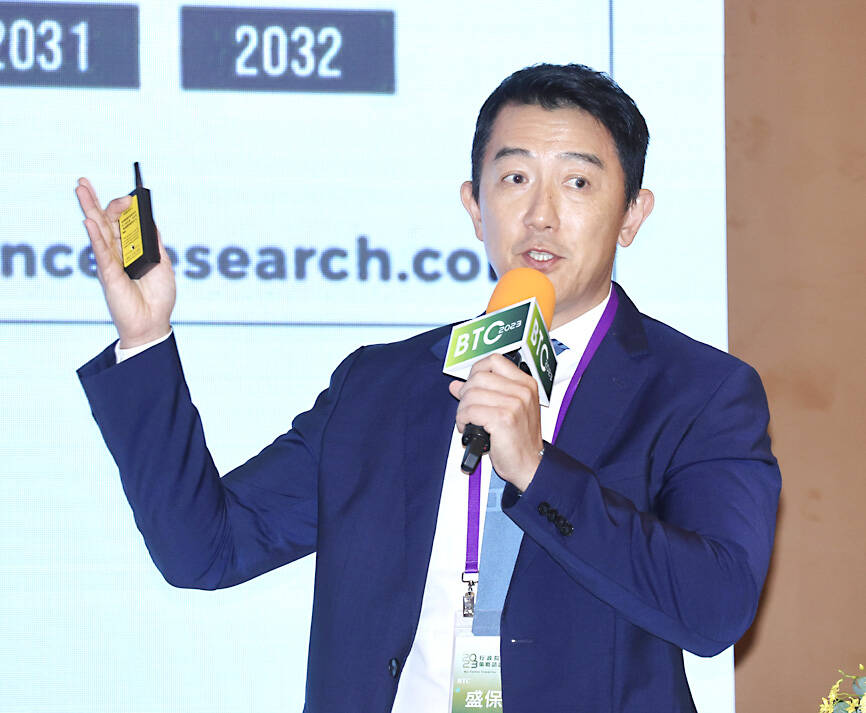Bora Pharmaceuticals Co (保瑞藥業) is still looking at contract development and manufacturing organizations (CDMOs) as potential merger and acquisition (M&A) targets, as the company continues to expand its business scale, the medicine and healthcare product maker said yesterday.
The company has seen its market value surge by more than 50-fold in seven years through a series of strategic M&As, including acquiring Japan-based Eisai Co’s subsidiary and plant in Tainan’s Guantian District (官田) in 2013 and US-based Impax Laboratories Inc’s subsidiary and plant in Miaoli County’s Jhunan Township (竹南) in 2018.
“We expect to see new M&A opportunities emerge next year,” Chinese-language online news outlet Cnyes.com quoted Bora Pharmaceuticals chairman Bobby Sheng (盛保熙) as saying. “There are not many buyers in the US M&A market and the valuations of many CDMOs are much cheaper than before, which is relatively beneficial to us.”

Photo: CNA
Sheng made the remarks at a ceremony at the Taiwan Stock Exchange (TWSE), where the company made its share debut on the main board after transferring its listing from the Taipei Exchange.
Bora Pharmaceuticals shares fell 3.1 percent to close at NT$657, in line with losses across the main exchange. Prior to yesterday, the stock had surged more than 60 percent since the beginning of this year.
Due to the growing market demand for drugs, several major clients have already discussed placing more orders, Bora Pharmaceuticals said.
As a result, the company has furthered its acquisition efforts, including factories, companies and product portfolios, it said.
It would also continue to adjust product strategy at its subsidiary TWi Pharmaceuticals Inc (安成藥) in a bid to diversify away from generic drugs, after the unit in August acquired six brand product licenses and technologies from Morristown, New Jersey-based Almatica Pharma Inc, it said.
The new strategy would enable Bora to leverage its sales platforms to enter the brand product market, create a new revenue driver and improve its profit margin, as well as allow the company to have more resources for future investment, it said.
Bora Pharmaceuticals’ consolidated revenue grew 50.25 percent year-on-year to NT$13.25 billion (US$422.5 million) in the first 11 months of this year, ranking second among Taiwanese pharmaceutical companies, TWSE data showed.
Net profit in the first three quarters totaled NT$2.47 billion, up 149.43 percent from the same period last year, with earnings per share rising from NT$10.12 to NT$24.63 and gross margin improving from 35.02 percent to 48.16 percent, the data showed.

UNCERTAINTY: Innolux activated a stringent supply chain management mechanism, as it did during the COVID-19 pandemic, to ensure optimal inventory levels for customers Flat-panel display makers AUO Corp (友達) and Innolux Corp (群創) yesterday said that about 12 to 20 percent of their display business is at risk of potential US tariffs and that they would relocate production or shipment destinations to mitigate the levies’ effects. US tariffs would have a direct impact of US$200 million on AUO’s revenue, company chairman Paul Peng (彭雙浪) told reporters on the sidelines of the Touch Taiwan trade show in Taipei yesterday. That would make up about 12 percent of the company’s overall revenue. To cope with the tariff uncertainty, AUO plans to allocate its production to manufacturing facilities in

Taiwan will prioritize the development of silicon photonics by taking advantage of its strength in the semiconductor industry to build another shield to protect the local economy, National Development Council (NDC) Minister Paul Liu (劉鏡清) said yesterday. Speaking at a meeting of the legislature’s Economics Committee, Liu said Taiwan already has the artificial intelligence (AI) industry as a shield, after the semiconductor industry, to safeguard the country, and is looking at new unique fields to build more economic shields. While Taiwan will further strengthen its existing shields, over the longer term, the country is determined to focus on such potential segments as

TAKING STOCK: A Taiwanese cookware firm in Vietnam urged customers to assess inventory or place orders early so shipments can reach the US while tariffs are paused Taiwanese businesses in Vietnam are exploring alternatives after the White House imposed a 46 percent import duty on Vietnamese goods, following US President Donald Trump’s announcement of “reciprocal” tariffs on the US’ trading partners. Lo Shih-liang (羅世良), chairman of Brico Industry Co (裕茂工業), a Taiwanese company that manufactures cast iron cookware and stove components in Vietnam, said that more than 40 percent of his business was tied to the US market, describing the constant US policy shifts as an emotional roller coaster. “I work during the day and stay up all night watching the news. I’ve been following US news until 3am

COLLABORATION: Given Taiwan’s key position in global supply chains, the US firm is discussing strategies with local partners and clients to deal with global uncertainties Advanced Micro Devices Inc (AMD) yesterday said it is meeting with local ecosystem partners, including Taiwan Semiconductor Manufacturing Co (TSMC, 台積電), to discuss strategies, including long-term manufacturing, to navigate uncertainties such as US tariffs, as Taiwan occupies an important position in global supply chains. AMD chief executive officer Lisa Su (蘇姿丰) told reporters that Taiwan is an important part of the chip designer’s ecosystem and she is discussing with partners and customers in Taiwan to forge strong collaborations on different areas during this critical period. AMD has just become the first artificial-intelligence (AI) server chip customer of TSMC to utilize its advanced